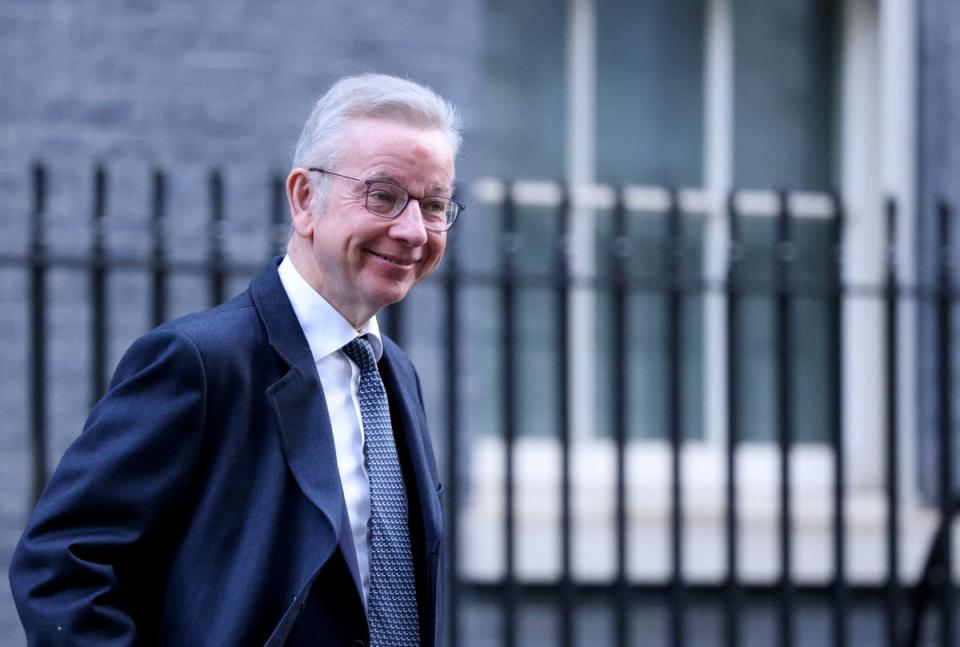Sunak hands councils £600m in emergency bailout amid cash crisis
Local authorities in England are to receive an emergency bailout from Rishi Sunak’s government following warnings that many councils are close to bankruptcy.
Communities secretary Michael Gove said upper tier councils will be handed an additional £600m, mostly for children’s and adult social care.
The cabinet minister said £500m would go on enabling councils to provide “crucial social care services for their local communities, particularly children”.
The government has also increased the “funding guarantee” – which sets out the minimum percentage annual increase in money available to all councils before local decisions on council tax – from 3 per cent to 4 per cent.
The move comes after a group of 40 Tory MPs – including Priti Patel and Robert Jenrick – put Mr Sunak under pressure to boost the £64bn funding settlement for on-the-brink councils ahead of this year’s general election.
Dozens of backbenchers signed a letter to the PM warning that without emergency cash, many councils will be forced to cut crucial frontline services and hike council tax as voters go to the polls.
The group – which also included leading ‘One Nation’ Tory moderate Damian Green – say they were “exceptionally concerned” about the crisis in local government and were “disappointed” it had not be addressed at chancellor Jeremy Hunt’s autumn statement.

Ben Bradley, the Tory MP for Mansfield and leader of Nottinghamshire County Council, said the extra funding would be “strongly welcomed” . He had warned that “there’s no point cutting national taxes just to see everybody’s council tax go up by the maximum”.
Mr Hunt could consider using some of the fiscal headroom – which predictions have put as high as £10bn – to cave to their demands for more council cash as he prepares for his 6 March Budget.
While welcoming the extra cash, council leaders have called for an end to “short-term” measures.
Sir Stephen Houghton, Labour leader of Barnsley Council and chairman of the Special Interest Group of Municipal Authorities (SIGMA), said the extra funding would provide short-term help, but would not address the long-term funding gap and need for reform to a “broken” finance model.
Finance bosses at seven councils have issued at least one section 114 notice – effectively declaring themselves bankrupt – since 2020, with three doing so last year.
In December Nottingham City Council became the latest to issue a section 114 notice, saying it was set to overspend by £23m in 2023-24.
But almost one in five council leaders think it is likely that they will need to issue a section 114 notice this year, according to a survey by the Local Government Association (LGA).
The emergency notices are an acknowledgment that the local authority cannot balance its books as required by law and lead to a freeze on non-essential spending on services.
Mr Gove’s Department of Levelling Up, Housing and Communities said the £64bn pledged was a real-terms increase of 6.5 per cent for councils on average.
However, the total spending power available to councils includes council tax increases, meaning residents pay more for everyday services.
District council leaders also held an emergency meeting in Westminster on Tuesday to urge the government to rethink the settlement due to the rising costs of tacking homelessness.
A group of local authorities said Mr Gove’s funding settlement disproportionately benefits richer areas and fail to take into account a range of growing demand pressures.
Sigoma – which represents 47 urban councils in some of the most deprived areas in England – said it was set before the full emergence of severe problems such as workforce pressures and spiralling costs in a “broken” children’s social care market.


